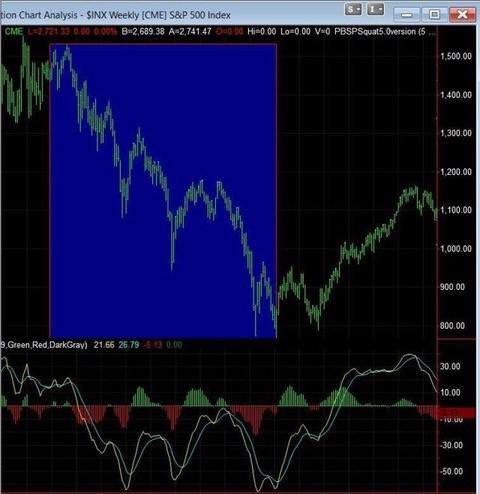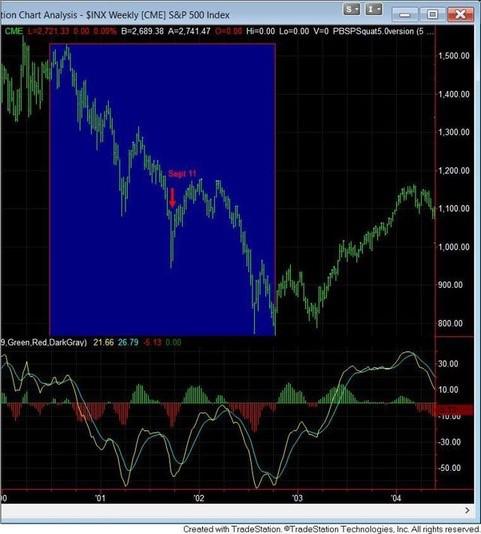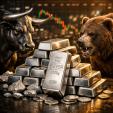This Analysis Will Change The Way You Invest Forever (Part 2)
After writing publicly for over seven years now, the most common comment I have seen to my articles suggests that once a major news or fundamental event occurs it would completely invalidate my wave count, as the market will certainly move based upon the substance of that news or fundamental event.
When I challenge these commenters to provide me just one event in recent history that proves the market changed direction based upon a news or fundamental event, the most common example provided is the 9/11 event of 2001. So, before I move into why these commenters are wrong, let’s take a moment to perform a simple exercise.
Since most everyone views the 9/11 event as the most significant event of our modern times, I am sure everyone would have no problem picking out on a chart where this occurred. I mean, if the most significant event of our time had an equally impactful effect upon our markets, as almost everyone assumes it did, then it should be quite easy to pick it out on the chart.

Now, if you think you have identified the obvious point on this chart where the most significant event of the last 70 years occurred, let’s see if you are right?

I am quite certain that most of you probably thought that it occurred near the highs of this chart, and caused the entire decline evident on the chart. But, as you can see, we were already in a multi-year decline when 9/11 occurred, and we were closer to a bottoming in the market than a top. Moreover, take note that there were even larger drops seen during this downtrend than the one "begun" on Sept. 11th.
In fact, the market bottomed the week after the 9/11 event, and then rallied to a level 10% higher than where we were right before 9/11. Maybe we can actually say that 9/11 caused the selling capitulation we often see at a bottom to the market, and then caused a 20% rally? Well, the facts support such a conclusion, even though the predominant presumptions about how major news events affect the market do not.
So, in this second installment of our series, I am going to explain why Elliott Wave analysis will keep you on the right side of the market despite the fact that many of you believe that the news of the day, or some event, will override the wave count.
If you have not figured it out yet, there has been no instance where a major world or fundamental event changed the larger degree wave count or trend of our stock market. (And, please do not post in the comment section “what happens if an asteroid hits the earth and destroys half the planet).
In a 1988 study conducted by Cutler, Poterba, and Summers entitled “What Moves Stock Prices,” they reviewed stock market price action after major economic or other type of news (including major political events) in order to develop a model through which one would be able to predict market moves RETROSPECTIVELY. Yes, you heard me right. They were not even at the stage yet of developing a prospective prediction model.
However, the study concluded that “[m]acroeconomic news bearing on fundamental values explains only about one fifth of the movement in stock market prices.” In fact, they even noted that “many of the largest market movements in recent years have occurred on days when there were no major news events.” They also concluded that “[t]here is surprisingly small effect [from] big news [of] political developments . . . and international events.”
In August 1998, the Atlanta Journal-Constitution published an article by Tom Walker, who conducted his own study of 42 years’ worth of “surprise” news events and the stock market’s corresponding reactions. His conclusion, which will be surprising to most, was that it was exceptionally difficult to identify a connection between market trading and dramatic surprise news. Based upon Walker's study and conclusions, even if you had the news beforehand, you would still not be able to determine the direction of the market only based upon such news.
In 2008, another study was conducted, in which they reviewed more than 90,000 news items relevant to hundreds of stocks over a two-year period. They concluded that large movements in the stocks were NOT linked to any news items:
“Most such jumps weren’t directly associated with any news at all, and most news items didn’t cause any jumps.”
And, just over the last several years alone, how many of you were following the news events such as Brexit, North Korea, terrorist attacks, cessation of QE, record hurricane damage in Houston, Florida, and Puerto Rico, Syrian missile attack, interest rates rising, Crimea, quantitative tightening, Trump, etc., and expected the market to crash on just one of these events? Yet, even taken cumulatively, the market continued to rally over 40% during the last several years. Do you still want to assume that geopolitical events or news will drive our markets?
In 1941, Elliott stated, regarding the financial markets, that “[t]hese [Fibonacci] ratios and series have been controlling and limited the extent and duration of price trends, irrespective of wars, politics, production indices, the supply of money, general purchasing power, and other generally accepted methods of determining stock values.” As you can see, the more research conducted into this subject, the more support we find to Elliott’s theories set out almost 100 years ago.
In moving onto studies conducted on individuals rather than stock market history, these will likely be of great interest to those who are seeking the truth about the human thought process.
In 1997, the Europhysics Letters published a study conducted by Caldarelli, Marsili and Zhang, in which subjects simulated trading currencies, however, there were no exogenous factors that were involved in potentially affecting the trading pattern. Their specific goal was to observe financial market psychology “in the absence of external factors.”
One of the noted findings was that the trading behavior of the participants were “very similar to that observed in the real economy,“ wherein the price distributions were based on Phi.
In a different study conducted at the School of Social Sciences at the University of California, they came to the conclusion that “We may suppose that in a human being, there is a special algorithm for working with codes independent of particular objects.” Specifically, when subjects were asked to sort indistinguishable objects into two piles, their decision making within that process divided the objects into a 62/38 ratio. In other words, these individuals exhibited a Fibonacci tendency in their personal decision making.
Therefore, the more research that is being done into this issue, the more evidence we are uncovering that behavior and decision making within a herd and on an individual basis displays mathematically driven distributions based on Phi, which do not seem to be affected by exogenous events.
This basically means that mass decision making will move forward and move backward based upon mathematical relationships within their movements, and not based upon outside stimuli. This is the same mathematical basis with which nature is governed, as Elliott stated back in 1941.
So, by now, I am hoping we can all move past perspectives that news, fundamentals, or geopolitics controls our market. If you are still with me after this week’s installment, then you can look forward to next week’s installment which will give you a background into who Leornardo Fibonacci was, and why his discovery is so important to us when analyzing the stock market.






 Avi Gilburt is a widely followed Elliott Wave technical analyst and author of
Avi Gilburt is a widely followed Elliott Wave technical analyst and author of 








